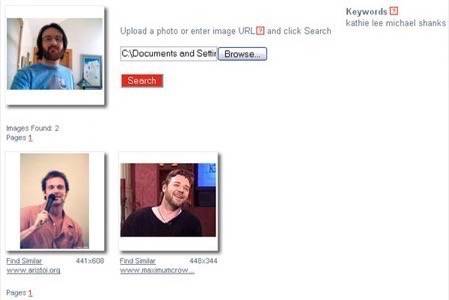There are a bunch of companies trying to figure out how to get a machine to be correctly identify images just by looking at them. We’ve profiled a bunch on ReadWriteWeb before: Eyealike, Mugr, Riya/Like, and Pixsta. Generally the tech demos for these visual search technologies fall into two categories: shopping search or facial recognition. The latter is on display in a new Russian startup we came across this week called Picollator.

We noted last April the problems with current gen image search, which relies on keyword analysis to determine what a picture’s subject matter is. While Google and the other major search engines have gotten pretty good at using clues in surrounding text to identify what’s in a picture, they’re not perfect and often serve up lousy results — especially when there is a small sample size.
So a search technology that actually looked at a picture and could understand what was in it — or at least match like images — would have a large number of practical applications. Picollator’s online demo is based on software of the same name from parent company Recogmission. The demo allows users to upload an image of a face to the site, and then attempts to match it to similar images it has gathered from around the web.

One of the main issues we’ve noticed with most of these facial recognition products is their inability to deal with my facial hear — sometimes even thinking that my dark beard is really an indication of my skin tone. So I was excited when Picollator matched me to a picture of Russell Crowe. I don’t really look like Crowe, but believe it or not, people actually used to tell me I did back in college.
Unfortunately for Picollator, subsequent tests with different images were less successful. It had trouble dealing with an older picture of mine (though to be fair it had less face and more body), and also didn’t respond well to a black and white picture. And if their software really is accurate, I am dating a girl who basically looks like any celebrity that smiles.
What that means is basically that image recognition software still has a long way to go. Certainly, these technologies will improve over time, but for now, the flawed approach of text based image search from Google, Yahoo! and the other big search engines is probably the best way to go.

















